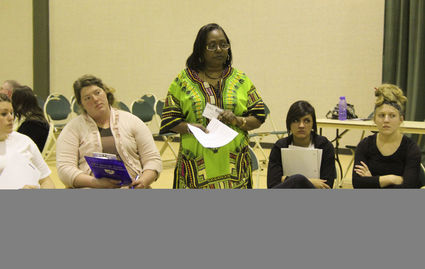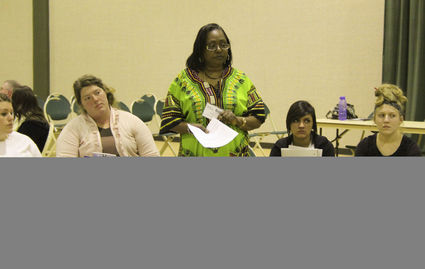LSC-O students shown a different side of life
Last updated 2/21/2013 at Noon
Poverty is not a term that the majority of Orange residents think about on a daily basis, nor are most people comfortable thinking about it all. But unfortunately, in today’s economy, poverty is a real issue and is one that the Orange and remaining Southeast Texas areas are not exempt from. Lamar State College-Orange hosted a poverty simulation on campus on Feb. 15, facilitated by the Nonprofit Development Center and funded by Entergy Texas.
In June 2012, the Texas Workforce Commission reported that Orange County had a 10.9 percent unemployment rate; in turn, a 2006-2010 American Community Survey reported that 11.5 percent of Orange County families lived below the poverty line. The goal of the poverty simulation is to foster and encourage a significant change in beliefs, attitudes, and awareness toward those living in poverty. The Nonprofit Development Center says they hope that with this awareness, participants will share with their coworkers a commitment or recommitment to evaluate services provided to this population, and to better serve them.
“We can better serve them by recognizing, and reducing or eliminating the challenges and obstacles low-income clients encounter,” said Dean Terrebonne, executive director of the Nonprofit Development Center. “Through the simulation experience, they can, in turn, strive to reduce or eliminate some of the barriers that this population experiences.
”While Entergy Texas provided funding for the Center to facilitate the Simulation, and the Center was the sponsor, Deborah Mitchell of the North Early Learning Center encouraged the participation of the LSC-O students, staff, community and local agency representatives. Some staff and faculty from West Orange-Stark CISD participated alongside LSC-O students. One LSC-O student, in particular, says she would strongly recommend the simulation to every other student.
“The majority of students here are attending school to work for the general public in some way,” said nursing student, Ami Picou. “Therefore, it would be a great opportunity to build knowledge and extend your emotional career.”
According to the Nonprofit Development Center’s website, the Community Action Poverty Simulation “provides participants with the opportunity to assume the role of a low-income family member living on a limited budget. The experience is divided into four 15-minute sessions, each of which represents one week in which you must provide for your family and maintain your home.
Picou was simulated as a 13-year-old girl whose life was turned upside down when her father was incarcerated. Because her mother abandoned her, the household duties and bills were left to her 21-year-old brother who tried to make ends meet with his monthly $200 college scholarship, supporting two other younger siblings in the home.“I learned the great difficulty of trying to achieve any goal, big or small, when lack of money is the most important issue that consumes every waking minute of the day,” said Picou. “This program opened my eyes to the unfair stigma placed upon low income families simply because of the lack of understanding of their situations.
”Terrebonne said that, based on his observations, the majority of the students took the simulation very seriously, especially those who have not yet had to face the challenges of securing and maintaining housing, and the bills that go along with that.
Participants should, at a minimum, leave the simulation with a greater appreciation of what they possess, what opportunities they have been afforded, what they have accomplished, and be thankful for them.
He said additionally, students can and should have a role in sharing their experience, strive to improve services to those in poverty, and to advocate for change to enable those low-income households to seek the services to end their cycle of poverty.
“Most nonprofits provide direct services, and most who do, provide services to low-income populations and individuals who live in poverty,” said Terrebonne. “By providing the simulations, we increase the awareness within the community, thus increasing the sensitivity of those who provide the services and those who support the nonprofits, financially.”















Reader Comments(0)